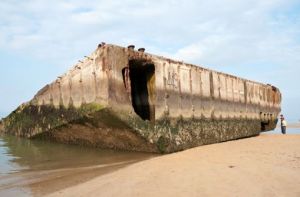Archives
Feature, Freight News, Sea
The day that Britain’s ports helped free Europe
[ June 6, 2019 // Chris ]Three quarters of a century on from D-Day on 6 June 1944, ABP is reflecting on the incredible courage and sacrifice made when Allied forces landed on the Normandy coast – and the part that many of its ports played in those momentous events.
“Many of our ports in ABP played a key role in the preparations and successful execution of D-Day,” explains ABP’s director of marine and compliance, Mike McCartain. “It is with considerable pride and admiration we remember today all of those who took part in this monumental and courageous logistical operation, as well as those who fought so bravely in the days and weeks that followed.”
On D-Day, the Port of Southampton was the major embarkation point for the British and Canadian troops, with up to two thirds of those who took part in the initial assault having sailed from there. Over a quarter of a million vehicles and over three and a half million men sailed from Southampton between D-Day and the end of the war.
“In a city rich in history, none has more significance than the role played by the city and port during World War Two, from the design and construction of the Spitfire early in the war to the key role played in supporting the big push towards the end of the war,” added port of Southampton director, Alastair Welch.
Casualties from the landings were also taken back to Southampton.
Many other ABP ports, such as Cardiff, Teignmouth and Plymouth, were also important embarkation points for Allied troops, and helped stage local invasion rehearsals.
ABP’s ports on the Humber were a big support centre, with Hull handling huge quantities of ammunition and stores for the US Forces. In the weeks leading up to D-Day, many ships that were sent to Normandy were loaded up with their ammunition in the Port of Hull.
Hull’s importance as a key strategic port on the north east coast led to it being the most damaged British city during the war, with 95% of houses affected.
Many sections of the Mulberry Harbour, the vital artificial floating ports used in the D-Day landings, were constructed in the Port of Goole. These were floated down the Humber to the Port of Immingham, where they were collected and taken to the English Channel – today, the road that divides the Port of Goole is called Normandy Way. Sections of the Mulberry Harbour were also built in the Port of Southampton.
“It is vitally important we honour all those who were involved with D-Day and the sacrifices made,” said Humber director Simon Bird. “Many of our employees, past and present, have connections to the preparations for D-Day and I have met colleagues with their own personal family stories. We must also honour the huge sacrifice of both Hull and Grimsby and all those who worked in the ports during the war. Grimsby was the base of the Royal Naval Patrol Service, and many of those who served in it lost their lives clearing mines from the Humber approaches, whilst Hull suffered hugely from bombing raids.”
Now immobile on the beach at Arromanche, this section of Mulberry Harbour could well have started its journey in Goole, or Southampton
Tags: ABP












